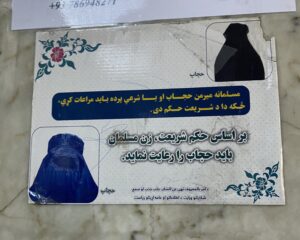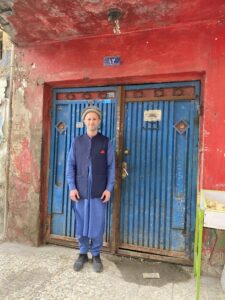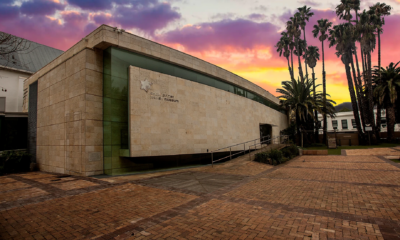
Personal Story

Lone Jew encounters ‘world without women’ in Afghanistan
Published
11 months agoon
By
Dan Brotman“In the name of Allah and the Afghan people, we have triumphed over the US,” boasted a commanding mural in Kabul, the capital of Afghanistan. A cascade of American flag stripes tumbled like falling dominos. These were the eye-catching welcomes to a Jewish guy like me to the Islamic Emirate of Afghanistan, once more under Taliban rule following the withdrawal of American troops in 2021.
My visit to Taliban-governed Afghanistan was part of a research trip organised by an adventure tour company specialising in off-the-beaten path expeditions to destinations like Iran, Iraq, and North Korea. This was the company’s first trip back to the country since the Taliban takeover, and our group of seven was there to test the viability of bringing groups back on a regular basis.
Our first port of call for entering Afghanistan was Peshawar, a Pakistani city close to the Afghan border. There, we chanced upon an antique store in the local bazaar. Among its myriad treasures, a tile with Hebrew inscription “Issachar” – denoting one of Israel’s 12 tribes – piqued my curiosity. Depicting a donkey in line with the Biblical representation, the tile, surprisingly, had originated from Herat, the former centre of Jewish life in Afghanistan. Unaware of the tile’s Jewish significance, the proprietor sold me this relic of an extinct Jewish community for a nominal $50 (R985).

The following day, our fixer bribed the security guard at the Afghan Consulate with jewellery to grant us entry and bypass the throng of refugees waiting patiently under the searing sun, as we had a flight to catch. As we waited for our visas, we struck up a conversation with Afghan refugees living around the world applying for the necessary documents to visit their homeland or aid relatives in emigrating.
We were issued with Afghan visas, mine in my South African passport, just hours before our scheduled flight to Kabul. We promptly changed into traditional Afghan clothing purchased in Peshawar, consisting of a loose-fitting shirt that falls to the knees, baggy trousers, and a woollen hat worn by Pashtuns, the largest tribe. The Taliban have outlawed Western clothing, thus our attire for the week served as both a mark of respect as well as a legal obligation.
When the Taliban regained control over the country, they abruptly dismissed nearly all women from their employment and prohibited females from pursuing education beyond Grade 6. This was a stark shift for a nation that had adopted legislation in 2009 that made it a criminal act to hinder women from owning property, attending school, or working.
A glimpse into a world without women – that’s the stark reality of present-day Afghanistan. Women, rarely seen on the streets, are generally barred from entering parks, markets, and restaurants. The conspicuous absence of mothers from breakfast cereal TV adverts, and all-male game shows mirrors this reality. Even the occasional female news presenter is obliged to veil her face with a medical mask.
Two experiences in the city of Bamiyan highlighted for me the plight of Afghan women. While we were touring the remains of the Buddhas of Bamiyan (two 6th-century monumental statues carved into the side of a cliff that were blown up by the Taliban in 2011), I spoke to a local female for the first and only time during my visit. She was a young woman meant to be in Grade 12, who had her formal studies cut short due to the prohibition on females attending high school.
She spoke fluent English, and was continuing to study English online at home, taught by Afghans living abroad. We were the first foreigners she had ever met in-person, and she shared with us her dream of one day moving to Dubai to be a businesswoman. I knew just how many bureaucratic and financial obstacles someone like her would have to overcome to make that dream become a reality, and that failing to achieve that dream would likely relegate her to a life confined to her home, potentially as a second, third, or fourth wife. Her cousin chimed in and said, “There is no place for women in Afghanistan under the Taliban.”
The second encounter was a brazen act of defiance. A woman in a truck spat at a Taliban soldier brandishing a Kalashnikov rifle at a major intersection, and then sped off. This tiny act of rebellion risked her and her family’s safety, perhaps a small glimpse into the depth of resentment Afghan women must feel under a regime that largely excludes them from public life and the economy.
Jewish life in Afghanistan, dating back to the 7th century CE, officially ended in 2021 when the last Jewish family immigrated to Canada. Through a mutual friend, I managed to contact one of the children living in Toronto, where they provided directions via SMS to Kabul’s synagogue. After getting a bit lost, my guide and I located a blue gate on Flower Street adorned with six Stars of David. I revealed my Jewish heritage to the neighbouring shopkeeper and pleaded for him to let me in, but was informed that since the Taliban takeover, non-Muslim places of worship remain firmly closed.

Hours before our departure, we strolled down Chicken Street, famed for its carpets, handicrafts, and antiques. In a moment of déjà vu from Peshawar, I spotted a blue glass medallion in an antique shop, once part of a necklace, bearing the emblem of Israel. The shop owner was also unaware of its Jewish origins, and I used my remaining $6 (R118) to acquire it. I can only assume that this medallion once belonged to a member of the country’s once dwindling Jewish community, which was down to 300 members in the 1970s. This relic, now back in a Jewish home for the first time in many decades, bears witness to the turbulent history and changing times in this ever-troubled country.
- Dan Brotman is a former member of the South African Jewish community currently living in Windsor, Canada. You can follow his travels on Instagram by following him at @danbrotman.










